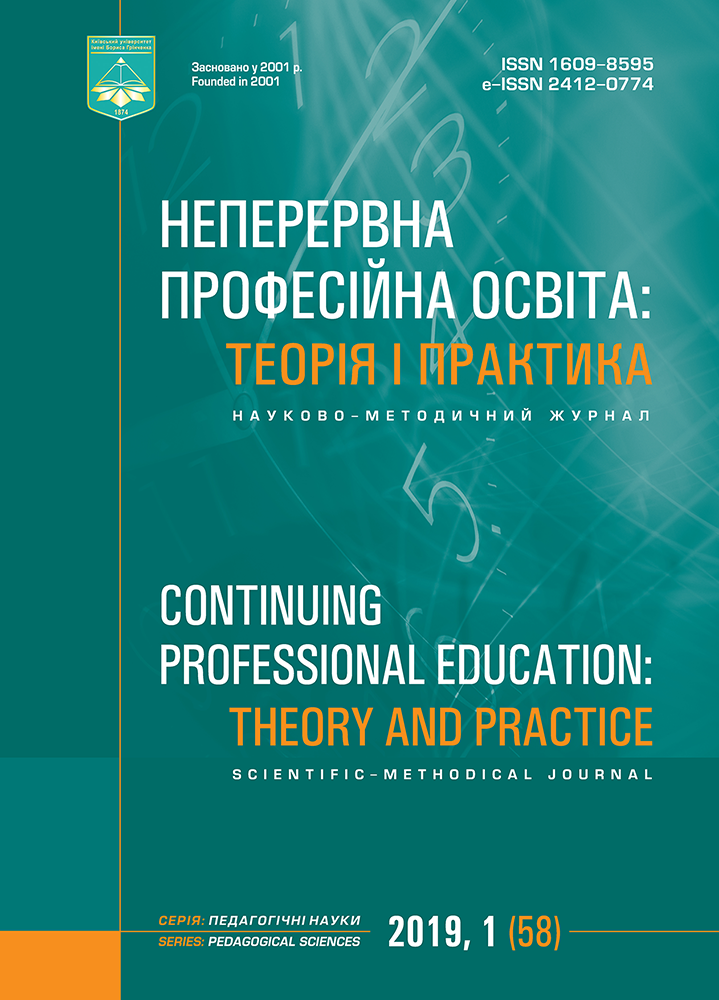PROBLEM OF UNITY OF RATIONAL AND SENSUAL IN DEVELOPMENT OF COGNITIVE ABILITIES
DOI:
https://doi.org/10.28925/1609-8595.2019.1.2329Keywords:
cognition, era, heart, history, philosophy, rationalism, reason, sensoriaAbstract
The problem of the unity of the rational and the sensorial, of the cognitive and affective processes in the human psyche has deep roots in prehistoric times, when the civilization originated in the form of the primitive society. That period is considered to be the basis, on which the historically original form of cognizance of the world was formed, i. e. the mythological and pagan worldview of the primitive people. In various forms of collective creativity, the syncretism of their thinking manifested itself that, in turn, testified to the undivided nature of their attitude to the surrounding world in its unity of intellectual, sensorial and volitional manifestations. With the advent of the naively spontaneous philosophical outlook characteristic of the philosophy of nature, the notion of «logos» appeared in the sense of the general law of being, the very foundation of the Universe and the human existence. Ancient Greek thinkers began the centuries-old Occidental tradition of exalting the reason over sensations. In medieval times, philosophical thinking depended on religion and, therefore, in the initial period of its development, the so-called patristic, the leading principle was the recognition of the primacy of faith over reason. At the same time, opposing views were also expressed about the identity of the above notions and their harmonious coexistence. During the era of the Renaissance, the role of the reason and logic was also exalted in contrast to the sensoria. The philosophy of the modern era led to the emergence of the two opposing schools of philosophical knowledge, i. e. empiricism and rationalism, whose representatives, respectively, showed the primacy of either sensory experience or reason in the process of cognition. In that period, the «logic of the heart» emerged that purported to be above both the sensoria and the reason. The heart was seen as a kind of an instrument of the faith endowed with the logic of its own. That period’s sensualist school of philosophy recognized sensations, sensual experience as the only source of knowledge. During the Enlightenment, the power of the human mind was asserting itself as the supreme ideal of the era, although some philosophical views did continue to espouse the «idea of the heart». In the self-same period, a tendency was observed to combine the advantages of rationalism and empiricism, the belief in the cognitive abilities of both the human mind and the human sensorial experience. In the German classical philosophy, with its dominant tendency towards the absolutization of the reason, there was also a parallel development of the tendencies towards the recognition of the priority of human sensations and the harmonization of the reason and sensoria. The whole set of epistemological problems of the modern philosophy is characterized by pluralism, the desire to synthesize the most fruitful ideas, theories, concepts, also including the idea of combining the opposite sides of the cognitive process, i. e. the rational and the sensorial.References
Andreyeva, I. N. (2011). Emotsionalnyi intellekt kak fenomen sovremennoi psikhologii [Emotional Intelligence as a Phenomenon of the Modern Psychology]. Novopolotsk, Belarus: Polotsk State University (rus).
Huberskyi, L. V., Nadolnyi, I. F., Andruschenko, V. P. (2006). Fіlosofіya [Philosophy]. Kyiv, Ukraine: Vikar (ukr).
Yaroshevets, V. (Ed.) (2005). Іstorіya fіlosofії. Slovnyk [The History of Philosophy: a Dictionary]. Kyiv, Ukraine: Znannya Ukrainy (ukr).
Kremen, V. G., Ilyin, V. V. (2005). Fіlosofіya: myslytelі, іdei, kontseptsіyi [Philosophy: Thinkers, Ideas, Concepts]. Kyiv, Ukraine: Knyga (ukr).
Levchuk, L. T., Kucheryuk, D. Y., Panchenko, V. I. (1997). Estetyka [Aesthetics]. Kyiv, Ukraine: Vyscha Shkola (ukr).
Lomov, B. F. (1984). Metodologicheskiye i teoreticheskiye problemy psikhologii [Methodological and Theoretical Problems of Psychology]. Moscow, Russia: Nauka (rus).
Misticheskoe bogoslovie [Mystical Theology] (1991). Kyiv, Ukraine: Put k Istine (ukr.) Novikov, A. V. (1976). Ot pozitivizma k intuitivizmu. Kriticheskiye ocherki burzhuaznoi Estetiki [From Positivism to Intuitivism. Critical Essays on the Bourgeois Aesthetics]. Moscow, Russia: Iskusstvo (rus).
Prychepiy, Y. M., Cherniy, A. M., Chekal, L. A. (2005). Fіlosofіya [Philosophy]. Kyiv, Ukraine: Akademiya (ukr).
Radugin, A. A. (2000). Filosofiya: kurs lektsiy [Philosophy: a Course of Lectures]. Moscow, Russia (rus).
Skrypchenko, O. V., Dolynska, L. V., Ohorodniychuk, Z. V. (2011). Zahalna psikhologіya [General Psychology]. Kyiv, Ukraine (ukr).
Spirkin, A. G. (2006). Filosofiya [Philosophy]. Moscow, Russia: Gardariki Publishing House (rus).
Freud, S. (1930). Nedovolstvo kulturoi [Civilization and Its Discontents]. Moscow, Russia (rus).
Cherniy, A. M. (2008). Relygіyeznavstvo [Religious studies]. Kyiv, Ukraine: Akademvydav (ukr).
Downloads
How to Cite
Issue
Section
License
Copyright (c) 2020 Lyudmyla Rakityanska

This work is licensed under a Creative Commons Attribution-NonCommercial 3.0 Unported License.



